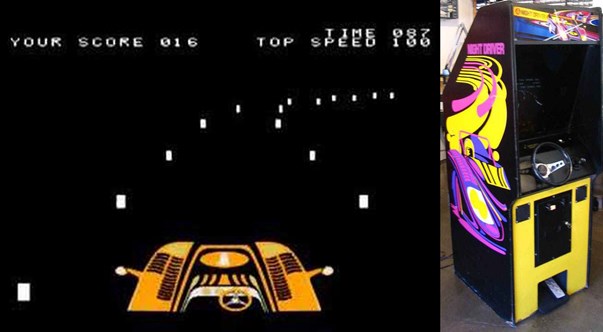From Games to Business: a journey into the unknown

The dilemma
So what happens when you’ve been a games programmer for 30 years and finally decide that the late nights, long hours and endless pressure are not worth it anymore? What happens when the passion of creating a product that’s fun for people to play is overtaken by a need to have a life but the passion for programming still remains? Such is the lifecycle and the dilemma of many programmers in the games industry. This is a short synopsis of the journey one such programmer took when faced with these questions.
In the beginning.....
As a young boy I can distinctly remember my first view of a video game and the start of my interest in computers. It was during the traditional family holiday to Pontins in the late 1970s and the sight of the road on Night Driver rolling along had me hypnotised from the start. I could hardly reach the pedals or the steering wheel but it didn’t matter. I was driving a car and I crashed a lot.
About the same time, magazines started appearing on the shelves featuring shiny new computers for the home. Most of the content was pretty serious but hidden amongst in the staid articles were advert for games. Not just games but arcade games and my imagination ran riot with the thought of having my very own arcade in my bedroom. Unfortunately the beasts of the time were priced so that it would have taken me 25 years of pocket money to get one.
Plastic box of wonders
Then on Xmas day in 1981 all that changed with a small black, plastic box with the name “Sinclair ZX81” written on the top. There was no mouse, no GUI, 1024 bytes of RAM and anything you typed seemed to result in a ‘Syntax Error’ or ‘Out of Memory’; but that didn’t matter because with a bit of perseverance you could still create a faithful reproduction of Night Driver (or a letter ‘A’ moving through a lot of letter ‘V’s). I also wrote an interest calculation program for my Dad; it kept him off my back whilst I shot Aliens and chased inverse quotation marks through mazes.

It sparked a life-long passion with making a dumb box of tricks do things that no-one else had done. Sure there were hundreds of versions of Space Invaders, but none of them were *quite* like mine.
Colour and a career?
An upgrade to an iconic ZX Spectrum gave way to real colour and sound. The possibilities were endless and in 1983 it all came to fruition, my first published game and the grand total of £500. I bought a BBC Micro and a copy of Defender because I didn’t care about anything else.
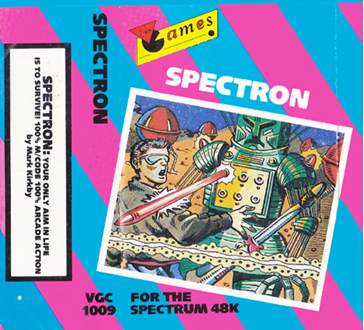
Years went by and my time was spent between School, College (trying to work towards a normal job), playing games and learning as much as I could about coding. By the time I left College, I admitted defeat and despite concerns from parents and teachers alike I decided that a normal job was not for me. I wanted to code but most of all, I wanted to write games.
The Code Monkeys MK1
In 1988 I got my first job at a small development house in a crappy upstairs ‘office’ in Armley. I was finally away from my solo programming path and thrown into a group of coders who all had their own techniques and opinions. Egos were rife but all that served to do was to push us even further. Then in early 1989, a particularly close trio of coders were approached by a publisher and asked if we wanted our own project. With the kind of disregard for the future that only youthful enthusiasm can muster, we accepted, set up our own company and dived into the next stage of the great adventure. Little did we know that it was actually just a dodgy plan by the producers to act as middle men by offering us peanuts whilst creaming money off the top for himself. They went to jail but we had made a start, we had our own company, we had Monkey suits and the sky was our limit.
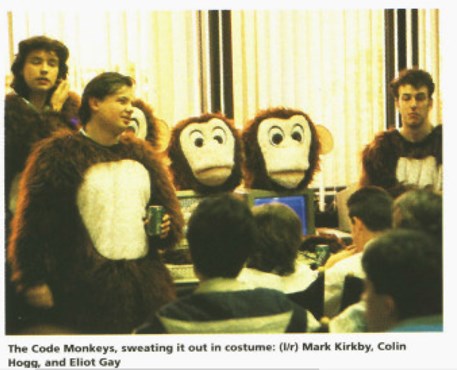
The bubble bursts
In the blink of an eye, 25 years went past. We’d produced games for everything from the C64 to the PlayStation 3 & every platform in between. Each year was a new challenge. At the start it was fun, we were young and the tight deadlines and long hours were things we took for granted and absorbed with enthusiasm; but as the years rolled on we began to realise that life was passing by and running a company was no longer the joy it had been. By the time we were making games for Sony, I was signing a monthly wages cheque for 35 people and sleeping on bubble wrap in the storeroom so we could get the next milestone out. Something had to give and 6 years ago I left the industry for good with no real idea where I was to go.
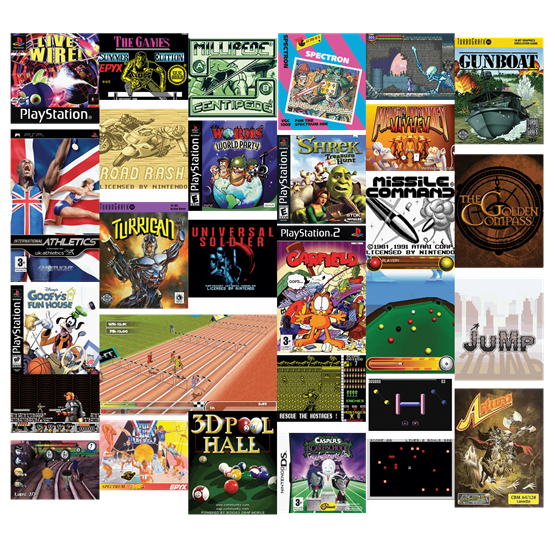
Getting serious
Then just as quickly came CAP. I met some bloke called Heath at a Xmas party and he said they were looking for a programmer who could help with their C++ and iPhone products. If there’s one thing that I can always be grateful to the games industry for, it’s the constant evolution of systems, techniques and languages which meant I had those areas covered. The burning question was, would I be able to transition?
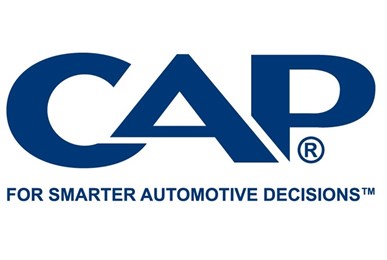
I needn’t have worried because at its very core, programming is programming and all the lessons I had learned down the years were more than relevant. I could see in the existing source code the same mistakes and shortcuts that we’ve all seen (& no doubt been responsible for) whatever the industry. With an insight into both industries, it was obvious that business & games had evolved down similar paths in their adoption of OO techniques and an ever increasing reliance on stable and efficient libraries.
To be fair, I wasn’t totally ignorant to non-games programming. In games development, each different platform and genre required their own specific set of tools to help with the build process and data generation so I already had experience of C# and .NET which was the direction CAP was already heading in. At the core of CAP's data, there was SQL to get to grips with as well as the whole architecture of the company; but despite being a challenge, there was nothing I couldn’t understand and pick up and run with just as I had been doing every year since those early days with my ZX81. Even Delphi. Delphi 5 to be precise, from 1999.
The Code Monkeys MK2
And so it continues…CAP now been bought by Solera, merged with HPI and the IT department has grown from just 5 to over 65 in 6 short years.

In a nod to the past our team has been given the old Code Monkeys name and the new global structure is designed to have a lifespan into the foreseeable future. It's a world away from the architecture I initially got a grips with, but when you drill right down to the core, whether it’s the data to be manipulated or presented, or the individual methods that perform a simple but vital piece of that processing, it always stays the same. Small chunks of logic and data processing. Programming is still programming and the very latest high end PCs still have the same fundamental core design of those very early machines. CPU, memory, input and output. It’s very easy to get intimidated by new languages or techniques and it’s very easy to be frightened of what at first appears to be a totally different industry and way of doing things but the simple lesson here is not to be.
The solution
So if you’re burnt out from getting the latest version of Grand Theft Auto finished or it's 3 weeks since you’ve seen your family, remember that a career change is not always a career change but sometimes just a different product….and if you think you’ll miss the creativity and the games industry as whole, just do what I did and turn it into a not for profit hobby.

Writing games on the ZX81 might not be profitable anymore but it sure is fun.

